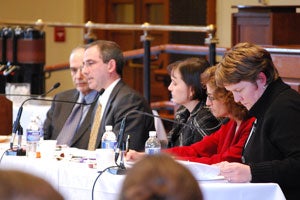“Localization of Immigration Law” was the subject of a Feb. 5 HLS symposium featuring speakers who took divergent views on the current American immigration enforcement scheme and its reliance on state and local law enforcement.
Sponsored by the Harvard Immigration Project and held in Austin Hall‘s Ames Courtroom, the symposium examined the effectiveness of federal and local attempts to enforce immigration law and took some looks at the future of comprehensive immigration reform. Panelists represented academia, government, think tanks, and advocacy groups, and oftentimes disagreed on whether the current scheme is wise or fair.
Yale Law School professor Michael J. Wishnie, who frequently handles cases as a cooperating attorney on the ACLU Immigrants’ Rights Project, said that relying on local authorities to enforce “broken and inhumane” immigration laws is a poor idea. He said that when local governments take on immigration-enforcement duties, it means that they must divert resources from other areas.
“But what concerns me at the local level is not only the structural implications,” he said. “It‘s whether this local activity tends to discriminate, stigmatize, and attack an already vulnerable population.”
Jessica Vaughn, of the conservative Center for Immigration Studies, had a different view. “This partnership program between state and local law-enforcement agencies and ICE (U.S. Immigration and Customs Enforcement) has enhanced the public-safety mission of both the federal and state and local agencies,” she said.
Vaughn was part of a panel, moderated by HLS professor Deborah Anker, that examined federal attempts to localize immigration law enforcement and she was speaking specifically of a program known as 287(g), named after the section in the 1996 immigration reform law. The program deputizes state and local authorities to enforce immigration laws and empowers them to begin deportation proceedings against illegal aliens and was a recurring topic throughout the symposium.
Aarti Shahani of Justice Strategies, a New York-based research and advocacy organization dealing with correctional policies, including detention and imprisonment of immigrants, disagreed on 287(g)’s value as an enforcement tool. She characterized 287(g) as a product of “devolution.”
“The primary strategy by the Department of Homeland Security to build its deportation capacity is through devolution, through these partnerships like 287(g),” she said.
She said that 287(g) allows local law enforcement to conduct background checks, via the ICE database, of people who aren’t even suspected of committing crimes and to detain them. Shahani said she once interviewed the notorious Sheriff Joe Arpaio of Maricopa County, known for his efforts to find and incarcerate illegal aliens, about his use of 287(g). “He said, ‘With 287g, when we stop a car, we don’t just take the driver; we can take everybody else in the car.’”
A panel moderated by HLS professor Gerald Neuman focused on the future of localization and the prospects for continued use of tools such as 287(g).
Speakers agreed that comprehensive immigration reform is something that Congress must take up but probably won’t this year. In the meantime, Wishnie said, there has been no let-up by the Obama administration to “vigorously and sometimes viciously enforce the same laws that are so broken in the dying days of those laws.” But he said that in a run-up to immigration reform, a stay on enforcement activity is essential.
Two of the speakers suggested that inclusion of state and local government in the immigration-enforcement system is not necessarily a bad thing and that immigration reform shouldn’t shut them out.
New York University School of Law professor Cristina Rodriguez said the best response may be an “integrated regime” involving concurrent authority between the federal government and the states. She suggested that one good model is Canada’s, which allows provinces to diverge from national law if their constituencies warrant it.
“We want to reach the point in the future where we realize this is a question of building a community and not a question of identifying two separate positions, one of which ultimately wins,” she said.
Kathleen Morris, a constitutional and public-policy litigator in the San Francisco City Attorney’s office (and is currently on a leave so she can teach at Rutgers-Camden Law School), agreed with Rodriguez on the role of local government in immigration enforcement.
“We have a history of thinking of our localities as parochial, adorable little creatures that can’t be trusted,” she said. “But what about instead thinking of them as the first line of representative democracy? If we saw them that way, it would make us want to give them resources instead of cutting resources.”
